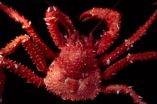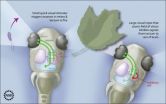(Press-News.org) Invasions of voracious predatory crabs due to global warming could threaten the unique continental-shelf ecosystems of Antarctica, according to newly published findings.
"King crabs are ecologically important predators and form the basis of economically significant commercial fisheries," said Dr Sven Thatje, an evolutionary ecologist at the University of Southampton's School of Ocean and Earth Science (SOES), which is based at the National Oceanography Centre in Southampton.
Thatje and graduate student Sally Hall studied how water temperature influences the distributions of king crab species in the Southern Ocean, which has some of the coldest waters on Earth.
King crabs are cold blooded, their body temperature being determined largely by that of the surrounding environment. Although many of them live in cold, deep-sea habitats, experiments have shown that their larvae fail to mature in water temperatures below around half a degree Celsius, even after only brief exposure.
"We tested the hypothesis that the king crab species of the Southern Ocean only thrive above a critical minimum temperature and that it is this thermal barrier that determines their biogeographical distributions in the Southern Ocean," said Thatje.
To do this, Thatje and Hall carefully studied the distribution of seventeen species of king crab living at depths between around 500 and 1600 metres in the Southern Ocean. They collated data from published records, museum collections, commercial fishing records, and reports from scientific research cruises. They then compared these records to water temperatures measured at a range of relevant depths and geographical latitudes.
Consistent with their hypothesis, they found that king crabs occur mostly at locations where the polar water temperature is relatively warm. The coldest waters in which king crabs have been found are between 0.4 and 0.5°C in the Ross Sea, suggesting that this indeed represents a thermal barrier limiting king crab distributions.
In addition, the records showed that only two species are endemic to waters south of 60 degrees South, suggesting that particular physiological and reproductive adaptations are required for life in the most extreme environments.
The researchers found that gaps in king crab distributions largely coincide with regions of low water temperature, although there are some anomalous absences yet to be explained.
Their findings imply that even relatively small increases in water temperature due to global warming could lead to king crabs moving into new areas.
"Rapidly increasing water temperatures observed along the West Antarctic Peninsula could allow king crabs to spread from the slope of the peninsula to the continental shelf itself," explained Hall.
This could have considerable ecological consequences. King crabs are voracious predators that crush and then feed on their prey, but they and potentially competing predators such as sharks and rays and other predatory crustaceans are largely absent on the high-Antarctic continental shelves.
"The worry is that the sudden appearance of a new predator with few competitors could threaten isolated shelf communities such as those of the Bellingshausen Sea on the west side of the Antarctic Peninsula," said Hall.
The researchers believe that their study provides a baseline against which future changes in the distribution of king crabs expected under global warming can be compared.
INFORMATION:
The study was supported by the Total Foundation (Abyss2100), the European Union's Sixth Framework Programme (FP6) Marine Biodiversity and Ecosystem Functioning (MarBEF) project, and by the Natural Environment Research Council.
Publication:
Hall, S. & Thatje, J. Temperature-driven biogeography of the deep-sea
family Lithodidae (Crustacea: Decapoda: Anomura) in the Southern Ocean. Polar Biology (published online, October 2010). DOI 10.1007/s00300-010-0890-0
King crab distributions limited by temperature in the Southern Ocean
2010-11-02
ELSE PRESS RELEASES FROM THIS DATE:
Scientists find that evergreen agriculture boosts crop yields
2010-11-02
THE HAGUE (2 November 2010)—A unique acacia known as a "fertilizer tree" has typically led to a doubling or tripling of maize yields in smallholder agriculture in Zambia and Malawi, according to evidence presented at a conference in the Hague today. The findings were central to the arguments of agroforestry experts at the conference, who urged decision makers to spread this technology more widely throughout the African nations most vulnerable to climate change and food shortages, and to think differently about more practical ways to solve the problems that are most pressing ...
At great expense, railroad bypassed first black-founded town in the US
2010-11-02
CHAMPAIGN, lll.— Ignoring topography, efficiency, expense and even their own surveyors' recommendations, regional railroad officials in the mid-19th century diverted a new rail line around New Philadelphia, Ill., "the first town in the United States planned, platted and legally registered by an African American," a University of Illinois researcher reports. The bypass pushed what would have been a fairly straight, even run of railroad tracks from Griggsville, Ill. to Hannibal, Mo., in a wide, hilly arc around New Philadelphia.
The findings, reported in Historical Archaeology, ...
For elderly, even short falls can be deadly
2010-11-02
While simple falls, such as slipping while walking off a curb, may seem relatively harmless, they can actually lead to severe injury and death in elderly individuals, according to a new study published in The Journal of Trauma: Injury, Infection, and Critical Care. As the population continues to age, it is important for physicians and caregivers to be aware of and prepared to deal with this issue, which could significantly impact the overall health and wellbeing of older adults.
In contrast to falls from greater heights, ground-level falls – essentially falls from a ...
New American Chemical Society podcast: Stop wasting food and save energy
2010-11-02
WASHINGTON, Nov. 1, 2010 — Generations of Moms and Grandmas have preached the virtues of not wasting food. Now scientists are reporting a compelling new reason to follow this advice: It could save enormous amounts of energy, according to the latest episode in the American Chemical Society's (ACS) award-winning podcast series, "Global Challenges/Chemistry Solutions." They say that the United States could immediately save the energy equivalent of about 350 million barrels of oil a year — without spending a penny or putting a ding in the quality of life: Just stop wasting ...
Microreactor speeds nanotech particle production by 500 times
2010-11-02
CORVALLIS, Ore. – Engineers at Oregon State University have discovered a new method to speed the production rate of nanoparticles by 500 times, an advance that could play an important role in making nanotechnology products more commercially practical.
The approach uses an arrayed microchannel reactor and a "laminated architecture" in which many sheets, each with thousands of microchannels in them, are stacked in parallel to provide a high volume of production and excellent control of the processes involved.
Applications could be possible in improved sensors, medical ...
Diverse surgeons initiative effectively increases underrepresented minorities in academic surgery
2010-11-02
CHICAGO (November 1, 2010) – According to a report published in the October issue of the Journal of the American College of Surgeons, a grant-funded program tailored to provide advanced minimally invasive surgery skills to young, underrepresented minority surgeons, is helping address shortages of minority faculty members at US medical institutions.
The report states that the Diverse Surgeons Initiative (DSI) has helped 86 percent of graduates in the program acquire fellowship training. These outcomes surpassed the 2005 national percentage of fifth-year residents in academic ...
Inhaled steroids increase diabetes risk, say Lady Davis Institute researchers
2010-11-02
Patients taking inhaled corticosteroids are at increased risk of developing type 2 diabetes, and more so with higher doses, say researchers at the Jewish General Hospital's Lady Davis Institute for Medical Research (LDI) In Montreal. The risk is of special concern for patients suffering from chronic obstructive pulmonary disorder (COPD), and much less significant for asthmatics.
"These medications are very effective in asthma, so the benefits clearly outweigh the risk for asthmatics," said Dr. Samy Suissa, Director of the Centre for Clinical Epidemiology at the LDI, and ...
Common stomach bacteria may fight off inflammatory bowel disease caused by Salmonella
2010-11-02
Ann Arbor, Mich. — Helicobacter pylori, a common stomach bacterium, reduced the severity of inflammation of the colon caused by Salmonella in mice, according to research from U-M Medical School scientists.
More than half the people in the world are infected with H. pylori, although it is very unusual to find it in the United States. But this research shows there may be an inflammation control benefit to hosting the H. pylori infection, says Peter Higgins, M.D., Ph.D., M.Sc., lead author of the study published last week in the journal Inflammatory Bowel Diseases.
"If ...
In the job hunt, people do lie, but honesty pays off, study finds
2010-11-02
Honesty pays off, according to a new study of job seekers. When job applicants were warned that a pre-employment test could detect fake responses, they gave more honest answers -- a result that could improve their chances of being hired. Results were published in the human resources journal Applied HRM Research.
"People may be tempted to make themselves look as attractive as possible to employers, but honesty is always the best policy, since many pre-employment tests have ways to spot fakers," said Chris Wright, associate professor of psychology at San Francisco State ...
The zebrafish's neural circuit prevents it from biting off more than it can chew
2010-11-02
Between alerting us to danger and allowing us to spot prey, vision keeps many animals, including humans, alive. But exactly how does this important sense work, and why is it easier for us to spot movement of small objects in our field of vision, than to notice other things? The complexity of the neural network that supports vision has long baffled scientists.
Now, with a new technology and support from the National Science Foundation, Claire Wyart in Ehud Isacoff's lab at the University of California at Berkeley and Filo Del Bene at Herwig Baier's lab at the University ...


